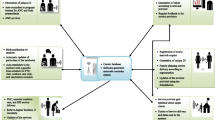Abstract
Use of mobile phones has the potential to transform maternal healthcare delivery in Uganda, with associated benefits of educating women on pregnancy, monitoring maternal, child progress and post-delivery support. Despite the benefits, user adoption of mobile phone technology for maternal healthcare remains low. There is a lack of understanding of the factors that affect the use of mobile phones in maternal healthcare practice. This paper reports on a study that aimed to determine factors deemed important for the adoption and use of mobile phone technology by healthcare professionals. The study used a questionnaire based field study to determine these factors. The study was carried out with the healthcare professionals working in the maternal sections in selected Health Centers in Wakiso district in Uganda. The results of the study indicate that perceived ease of use, perceived usefulness, social influence, facilitating conditions, perceived value, workflow practices are important factors for the adoption and use of mobile phones in maternal healthcare practice.
Access this chapter
Tax calculation will be finalised at checkout
Purchases are for personal use only
Similar content being viewed by others
References
Ministry of Health and Social Welfare Tanzania (MHSWT): A Performance Audit on the Monitoring, Evaluations and Budget Allocation for Maternal Health Care Activities in Tanzania (2011)
Nanda, G., Switlick, K., & Lule, E.: Accelerating progress towards achieving the MDG to improve maternal health: A collection of promising approaches. Health Nutrition and Population, the World Bank Discussion Paper (2005)
WHO (World Health Organization): The World Health Report 2000 Health Systems: Improving performance. World Health Organization, Geneva (2000)
Global Health Initiative: Uganda. A Strategy for accelerating reductions in Maternal and Neonatal Mortality. US Mission Uganda Interagency Health team (2011)
Nyamba, S.Y., Mlozi, R.S.: Factors influencing the use of mobile phones in communicating agricultural information: a case of Kilolo district, Iringa, Tanzania. Int. J. Inf. Commun. Technol. Res. 2(7), 2223–4985 (2012)
Intermedia: Mobile money in Uganda. Use, Barriers and Opportunities. The financial Inclusion Tracker Surveys Project (2012)
Oyeyemi, S.O.: The use of cell phone for maternal health: The Abiye Project. Thesis, Faculty of Health Sciences, Department of Clinical Medicine, University of Tromso, Sweden (2012)
Ssemaluulu, P., Muma, W., Mwase, M., Katongole, P.: Maternal monitoring: lowering child mortality by use of ICTs. Special topics in Computing and ICT research strengthening the role of ICT in development. Int. J. Comput. ICT Res. 4, 202–218 (2010)
World Health Organization: Make Every Mother and Child Count (2005)
Lawn, J.E., Cousens, S., Zupan, J.: Neonatal survival 1: 4 million neonatal deaths: when? where? why? Lancet 365(9462), 891–900 (2005)
World Bank: Safe motherhood and the World Bank: Lessons from 10 years of experience. World Bank, Washington (1999)
Panos, L.: Birth Rights: New Approaches to Safe Motherhood. Panos and the London School of Tropical Hygiene and Medicine, London (2001)
Mechael, P.N.: MOTecH: MHealth Ethnography Report. Dodowa Health Research Center for the Grameen Foundation, Washington, DC (2009)
Lund, S.: Mobile Phones can Save Lives, pp. 18–19. Profile ⁄ Global Health, University of Copenhagen, Copenhagen (2009)
Walakira, B.A., Nalweyiso. B.: Mobile Phones giving modern solutions for Child and Maternal Health (MCH) in Uganda. A Case of Health Child. Jinja District, Uganda (2011)
Nchise, A.C., Boateng, R., Shu, I., Mbarika, V.: Mobile phones in health care in Uganda: the applab study. Electron. J. Inf. Syst. Developing Countries 52(2), 1–15 (2012)
Earth Institute. : Barriers and gaps affecting mHealth in low and middle income countries: A policy white paper. Washington, DC: mHealth Alliance (2010)
Gurman, A.T., Rubin, E.S., Roess, A.A.: Effectiveness of mHealth behavior change communication interventions in developing countries: a systematic review of the literature. J. Health Commun.: Int. Perspect. 17(1), 82–104 (2012)
UNESCO.: Report of the Broadband Commission Digital Development to the United Nations Secretary-General (2010)
Lynch, T., Szorenyi, N., Lodhia, S.: Adoption of Information technologies in Fiji: Issues in the study of cultural influences on Information technology Acceptance. IT for Developing countries and indigenous people (2002)
Hill, C., Loch, K., Straub, D.W., El-Sheshai, K.: A qualitative assessment of Arab culture and information technology transfer. J. Global Inf. Manage. 6(3), 29–38 (1998)
Van Biljon, J.A., Kotze, P.: Cultural factors in a Mobile Phone Adoption and usage Model. J. Univ. Comput. Sci. 14(16), 2650–2679 (2008)
Kagumire, R.: How Uganda’s health care problems can end with a phone. The Independent (2009)
MOTECH, Mobile Technology for Community Health in Ghana.: What it is and what Grameen Foundation has learned so far. Grameen Foundation, Washington, DC, USA (2011)
De Tolly, K., Benjamin, P.: Mobile phones: opening new channels for health communication. In: Obregon, R., Waisbord, S., Handbook of global health communication. Wiley-Blackwell, West Sussex, UK (2012)
GSMA mWomen Programme: Striving and surviving: Exploring the lives of women at the base of the pyramid. GSMA mWomen, London (2012)
Furukwa, M.F., Ketcham, J.D., Rimsza, M.E.: Physician practice revenues and use of Information Technology in patient care. Med. Care 45(2), 168–176 (2007)
HURINET-U: The state of Regional Hospitals in Uganda; Economic, Social and Cultural Rights projects with Democracy Governance Facility (DFG) Uganda and DIAKONI (2012)
Author information
Authors and Affiliations
Corresponding author
Editor information
Editors and Affiliations
Rights and permissions
Copyright information
© 2015 Institute for Computer Sciences, Social Informatics and Telecommunications Engineering
About this paper
Cite this paper
Byomire, G., Maiga, G. (2015). Adoption and Use of Mobile Phones for Maternal Healthcare Service Delivery. In: Nungu, A., Pehrson, B., Sansa-Otim, J. (eds) e-Infrastructure and e-Services for Developing Countries. AFRICOMM 2014. Lecture Notes of the Institute for Computer Sciences, Social Informatics and Telecommunications Engineering, vol 147. Springer, Cham. https://doi.org/10.1007/978-3-319-16886-9_11
Download citation
DOI: https://doi.org/10.1007/978-3-319-16886-9_11
Published:
Publisher Name: Springer, Cham
Print ISBN: 978-3-319-16885-2
Online ISBN: 978-3-319-16886-9
eBook Packages: Computer ScienceComputer Science (R0)



